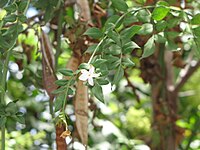
Photo from wikipedia
Methyl jasmonate (MJ) is an important plant growth regulator, involves in various physiological processes of plants. In the present study, role of MJ in tolerance to oilseed rape (Brassica napus… Click to show full abstract
Methyl jasmonate (MJ) is an important plant growth regulator, involves in various physiological processes of plants. In the present study, role of MJ in tolerance to oilseed rape (Brassica napus L.) roots under arsenic (As) stress was investigated. The treatments were comprised of three MJ doses (0, 0.1, and 1 µM) and two levels of As (0 and 200 µM). Arsenic stress resulted in oxidative damage as evidenced by decreased root growth and enhanced reactive oxygen species and lipid peroxidation. However, plants treated with MJ decreased the H2O2 and O2·− contents in roots and have higher antioxidant activities. Importantly, results showed that MJ enhanced the redox states of AsA and GSH, and the related enzymes involved in the AsA–GSH cycle. Moreover, MJ also induced the secondary metabolites related enzymes (PAL and PPO) activities, under As stress. PAL and PPO expression was further increased by MJ application in the roots of B. napus under As stress. MJ also reduced the total As content compared with As alone treated plants. These findings suggest the role of MJ in mitigation of the As-induced oxidative damage by regulating AsA and GSH redox states and by reducing As uptake in both cultivars.
Journal Title: Plant Growth Regulation
Year Published: 2017
Link to full text (if available)
Share on Social Media: Sign Up to like & get
recommendations!